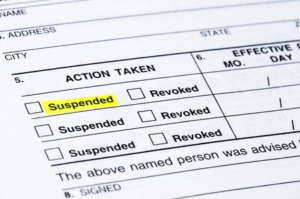I remember the first time I received a ticket like it was yesterday. The flashing lights from the police car, my heart felt like it was going to beat out of my chest because I realized I broke the law. I always tried my best to drive safely and follow the law, but we are not perfect beings. If you have ever experienced being pulled over, you know what I am talking about and the experience can be very overwhelming. The entire process from the time you receive the ticket, the cost of the violation, the aftermath of the ticket with your insurance, and the points on your driving record can turn into one enormous headache. You do not realize the cost of the ticket until you go through the process.
Unlike negative points, Virginia Department of Motor Vehicles (DMV) has put limits on how many safety positive points you can have on your driving record. When you are convicted of a traffic violation, the court notifies the DMV. The court system and DMV work together to ensure the safety of all drivers and to ensure all drivers on the road are legal.
So, What the Heck Is Included on Driving Record?
Your driving record is documented history of your record. Your record displays basic elements, such as your personal information (name, address, etc.), your license number and expiration date. When you request a copy of your driving record, you can anticipate seeing other things as well, such as:
 Your Driving Points
Your Driving Points
Your record shows if you have points added to your license because of reckless driving or other road related violations. The majority states operate on a point-based system, whereas others basically operate from how many violations you receive within a certain time frame. Click here to view DMV’s lists of traffic violations that have demerit points.
Driver’s License Status
Your record shows the up-to-date status of your driver’s license, for example, whether your license is valid, suspended, or revoked.
License Classifications or Endorsements
Your record shows if you have any special driving training, such as commercial driver’s license, school bus driving, student transportation, or hazardous material transportation.
Moving Violations
Your record shows if you have broken any laws of the road (for example speeding, rolling a stop sign, failing to yield, etc.). Your driving record also shows whether you have more serious infractions such as a hit and run or driving under the influence of drugs or alcohol.
DUI Convictions
Your record shows if you have been pulled over for driving under the influence of drugs and/or alcohol.
Traffic Accidents
Your record shows any points on your license because of accidents caused by reckless or negligent driving.
Owed Fees and/or Citations
Your record shows if you have received a citation for example a parking ticket or any other fees still owed by you.
Defensive Driving or Other Driving Courses Attended
Your record shows if you have taken a defensive driving course or attended traffic school, whether on your own or mandated by the court.
Did you know that if you received a moving violation in other states that demerit points will also be assigned to your driving record?
The length of time that a conviction stays on your driving record depends on the type of violation. Remember, if you are convicted of your traffic offensive your demerit points remain on your record for three to four years from the date that you commit the offense. The dates that demerit points are removed from your driving record are not related to the dates that convictions are removed from your record.
The question remains, how I can obtain positive points.
Every year that you drive safety without any accidents or traffic tickets, you received 1+ positive point from DMV. Another way you can obtain positive points on your driving record is to attend a Driving Improvement Class, which we offer at the Tri-City Driving School. Our Driving Improvement class is held every Saturday from 8 am to 4 pm. You can schedule your class on our website, or you can walk-in on the day of the class. When you take this class, you will receive five positive points on your driving record. So, if you are in the negative, this will bring you back on the positive side for your insurance and even for a job.
Let’s take a look at the process when you receive a traffic violation and how DMV reports and tracks your violation(s).
DMV does the following:
- Posts the conviction to your driving record;
- Assigns you demerit points according to the severity of the offense;
- Issues an order of suspension, or revocation if applicable;
- Issues an order requiring the successful completion of a driver improvement class
- Notifies your insurance company upon request.
If you are interested in signing up for a Tri-City Driving class, click here to learn more about what we have to offer and schedule your class, today.
#VirginiaDepartmentofMotorVehicles #DMV #TriCityDrivingSchool #movingviolation #drivingpoints #drivingrecord


